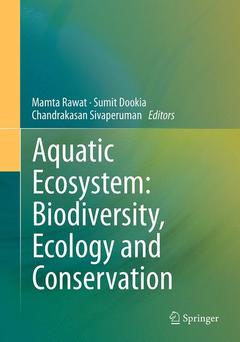Description
Aquatic Ecosystem: Biodiversity, Ecology and Conservation, Softcover reprint of the original 1st ed. 2015
Biodiversity, Ecology and Conservation
Language: English
Subjects for Aquatic Ecosystem: Biodiversity, Ecology and Conservation:
Publication date: 10-2016
Support: Print on demand
Publication date: 03-2015
333 p. · 17.8x25.4 cm · Hardback
Description
/li>Contents
/li>Biography
/li>Comment
/li>
1. Distribution of Aquatic Macrophytes in Balasore District, Odisha.- 2. Aquatic resources: A Case Study of Udaipur City.- 3. Limnological Variations of two Deccan Wetlands.- 4. Spatial Distribution of Benthic Macro Invertebrate Fauna in Mountain Streams of Uttarakhand, India.- 5. Diversity and distribution of Polychates (Annelida: Polychaeta) along Maharashtra Coast, India.- 6. Structure and dynamics of Rotifer community in a lotic ecosystem.- 7. Aquatic insect diversity of Baitarani Estuary of Odisha.- 8. Aquatic Entomofauna: Bug and Beetle Diversity of Hyderabad.- 9. Odonate Fauna of Rajasthan, India with links to Arabia and Himalaya.- 10. Odonata of Andaman and Nicobar Islands, India.- 11. Freshwater Molluscs of India : An Insight of into Their Diversity, Distribution and Conservation.- 12. Aquatic Oömycetology: A new field of futuristic research.- 13. Amphibians of Doon Valley (Dehra Dun, Uttarakhand) with their systematics, distribution, ecology, conservation status and threats.- 14. Fish fauna of Asan River and its tributaries, western Doon valley, Dehra Dun (Uttarakhand) with conservation status of species and threats.- 15. Fish Diversity of Chambal River, Rajasthan State.- 16. Length weight relationship and condition factor in Channa punctatus (Bloch) from Hussainsagar Lake, Hyderabad, Andhra Pradesh, India.- 17. Avian diversity of wetlands in and around Jodhpur, Western Rajasthan.- 18. Galloanseraes and aquatic Neoaves of Pong Dam wetland, Himachal Pradesh: Status and conservation issues.- 19. Living with Wetlands: A Case Study from the Wetlands (Beels) of Barpeta District, Assam.
It is an original research work in the field of aquatic biodiversity, wetland ecology and applied aspects with reference to aquatic resources across India
Provides up-to-date information of advancement and developments in aquatic ecology and aquatic biodiversity
Useful for the researchers in the field of biodiversity conservation and post graduate students in the disciplines of Wildlife Biology, Environmental Sciences, Wildlife Ecology, Zoology, Botany, & Life
Includes supplementary material: sn.pub/extras




